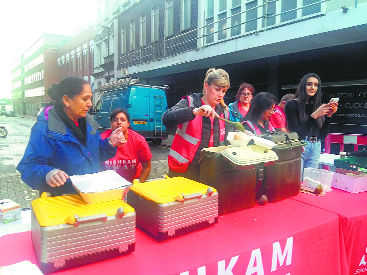Rohit Mahajan
The kind people of Nishkam SWAT have cajoled my friends to accept a box of food — as we rush towards the Southampton train station, we leave a trail of aroma that tells all that we’ve got — curry and samosas.
“The people with food for the homeless people… Are they still there?” a man stops by and asks us, having seen the food box and smelled the samosas. We nod, and he quickly makes his way up the High Street.
SWAT — Sikh Welfare & Awareness Team — holds street langars for the homeless at Southampton every Thursday, 7 pm. Simultaneous, Thursday langars hand out food at Strand, Oxford, Stratford and Colchester. And it’s just not Thursdays — through all week, throughout cities across the UK, SWAT teams distribute foods and collect the coins and banknotes the kind people passing by put in their charity boxes. “In Sikhism, there’s a huge focus on making sure that no one goes hungry,” says Satpal Kaur, project leader at the Southampton langar. “We might be far from where our forefathers come from, but it’s very important to cling to your roots.”
Selfless service
SWAT started its operations 11 years ago, and initially the focus was on helping the children navigate the challenges posed by multiculturalism in a country where people might believe in diametrically opposite things, and behave in a widely divergent manner. In 2009, SWAT launched its Homeless Project after realising it must do something for the 200-plus homeless men sleeping on the streets of Southall. The project is run only on donations, which include money, time and labour.
In the words of Satpal Kaur, the focus of SWAT is simple — remember God and earn an honest living, and then share the fruits of your hard work through selfless service of humanity. “That’s what Sikhism is all about,” she says.
Charity begins
It’s a secular country, but religion is closely aligned with charity. A study done by charity consultancy New Philanthropy Capital (NPC) has revealed that 4.8 per cent of the country is Muslim, but 23.2 per cent of faith-based charities are Muslim. Hindus and Sikhs make up 1 per cent and 0.7 per cent, respectively, of the UK’s population, and had 1.5 per cent and 0.8 per cent of all faith-based charities.
Christian charities have the biggest resources; the Jewish charities hold 6.2 per cent of income of all charities combined, despite being only 0.8 per cent of population. In other words, a small number of Jewish charities attract disproportional large donations. A revealing fact that emerged is that Jewish people donated 10 times more to Jewish causes than Hindus donated to Hindu causes. Muslims donated twice as much as Hindus.
Hindu focus
Lesser donations to Hindu charities could also indicate that Hindus are more integrated in the British society than other religious groups from the South Asian region —- anecdotally, the greater integration of Hindus is acknowledged by most people.
The focus of Hindu associations is more on celebrating festivals and cultural awareness.
The Gujarati Hindu community frequently takes the lead. The Chichester Vedic Cultural Society (CVCS) was founded in 2009 by the Gujarati community. The stated purpose of the society is to organise cultural events and to integrate better with the English community.
A sign of integration: the Chichester society regularly has the mayor of the town at its events, and regularly receives support from the West Sussex County Council.
“Spiritual upliftment of the society is our focus,” says Manu Janardhanan, closely associated with the Chichester society. “We want to look beyond religions, culture and ethnic backgrounds and hope to work for more integrated communities.” During the recent International Yoga Day, it worked with the Hindu Cultural Society to organise a yoga event in which around 200 people participated, a majority of them being white British.
That’s the power of yoga — not surprisingly, yoga integrates the Hindu community more than anything else with the native British.
Unlock Exclusive Insights with The Tribune Premium
Take your experience further with Premium access.
Thought-provoking Opinions, Expert Analysis, In-depth Insights and other Member Only Benefits
Already a Member? Sign In Now











